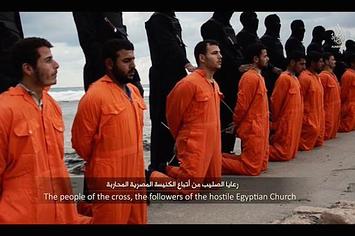(Reuters) - The
images match the worst of Islamic State's atrocities: black-clad
fighters and an English-speaking jihadist taunt the West before
slaughtering their victims in orange jumpsuits on a Libyan beach. Their masked leader
turns to the Mediterranean and points a bloodied knife towards Europe,
declaring, "We will conquer Rome, God willing." The execution of 21 Egyptian Christians by militants in Libya proclaiming allegiance to Islamic State was an announcement that the group, also known as ISIS or ISIL, has spread from Syria and Iraq to Libya. Militants have profited from chaos to claim a North African outpost a boat ride away from Italy's coast. International reaction came swiftly. Egyptian jets pounded suspected militant sites in Libya, and Paris joined Cairo in calling for U.N. action to halt the militants' spread. Libya
appears to be Islamic State's most successful move yet beyond its Middle
East heartland, likely attracting more recruits and increasing Western
fears of a new North African base for jihadist fighters. Yet
even as they thrive in Libya's unrest, Islamic State sympathizers must
contend with rivalries and factional infighting that make securing the
sort of territorial gains that IS has made in Iraq and Syria more complicated. "The statement in Libya
is more a statement of defiance," said Hassan Hassan, co-author of a
book on IS. "By killing Christian civilians, they were delivering a
message that they're expanding." The rise of IS comes as no surprise. Libya has descended into factional fighting, leaving the country almost lawless nearly four years after Muammar Gaddafi's fall. Two
competing governments backed by militia brigades are scrambling for
control. Diplomats have fled, Tripoli's airport is a bombed-out shell
and oil flow is a trickle as combatants trade rockets and air strikes. Libya's
IS sympathizers have used social media to display shows of strength,
parades of armed men and appeals to implement sharia law in the eastern
city of Derna, a stronghold of Islamist militancy. But this year IS militants in Libya have escalated operations. Last month, they claimed an assault on the Tripoli Corinthia hotel, killing nine people. Islamic State gunmen also attacked Libya's Al-Mabrook oilfield, where France's Total owns a stake. Some victims were beheaded. A
U.S. government source said U.S. officials do not yet know how many
attacks by Islamic State sympathizers are directly tied to the central
organization or are just "copycat" claims. But
analysts said the Egyptian killings, their video release via an
official IS outlet, excerpts from an IS magazine on the hostages and the
executions themselves suggested ties with IS command. TRAINING CAMPS In
December, General David Rodriguez, head of the U.S. Africa Command,
said a couple of hundred militants were in training camps in eastern Libya that were likely to send fighters to Syria. Now foreigners are being killed fighting for Islamist groups in Libya. Tunisian newspapers carry death notices of jihadists who have died not only in Syria or Iraq, but also in Libyan cities like Benghazi. For Egypt,
the rise of Islamic State just over its border is worrying. Egyptians
officials see ties between Libyan Islamists and militants in the Sinai. "What
you have is a chaotic country where Islamic State and other militant
groups are untouchable, on your border," a senior Egyptian security
source told Reuters. "Our goal is not to contain terrorists with air
strikes, our goal is to eradicate terrorism in Libya." Libya
is also host to Ansar al Sharia, blamed by Washington for an attack on
the U.S. consulate in Benghazi where the U.S. ambassador died, and al
Qaeda-linked groups as well as smaller Islamist rivals whose motives are
more local than global. That may limit the ability of IS to consolidate in Libya. "You
will end up with sporadic hits like the attack on the Corinthia," said
Geoff Porter, North Africa specialist and assistant professor at the
Combating Terrorism Center at West Point. "That is different from
holding territory, collecting taxes, providing state services." NEW ISLAMIST BASE? But
in Derna, a conservative city where Islamist hardliners once resisted
Gaddafi, residents say IS supporters are exerting more influence,
cracking down on public smoking and shisha pipe cafes. IS
is adept at propaganda that often exaggerates its victories, and social
media accounts are hard to verify. But in one image, IS militants
parade in a long column of Toyota jeeps near Sirte. Another image in
Derna shows IS supporters driving white SUVs with "Islamic Police"
emblazoned in black. Residents
and activists in Derna were wary of talking about militants, who have
carried out assassinations there. They said a Yemeni, believed to be
named Abu El-Bara El-Azadi, arrived in Derna late last year as a
representative of Islamic State. IS
has gathered local support in Derna through the Libyan group, Shura
Council of Islamic Youth. Even there in its main Libyan base, analysts
and residents say, it is not fully in control and faces resistance from
competing Islamist groups. But
IS may be "poaching" from other movements, especially among younger
fighters drawn to its powerful message and high profile, said Thomas
Joscelyn, who monitors jihadist movements for The Long War Journal. Several
residents said IS held the Egyptian Christian hostages in Derna, but
they saw them being transported out of the city about two weeks ago. A
camera crew was with them. Residents said after the video was released, IS members increased security and some leaders went underground. "There
now is a seed group of battle-hardened men who have fought with ISIS,"
said Harleen Gambhir at the Institute for the Study of War. "ISIS is
exerting control over Derna ... and it now has operating space to plan
larger attacks."
Islamic State lays claim to North African outpost
















Comments About This Article
Please fill the fields below.